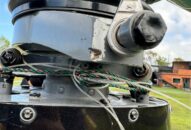Optimistic predictions for a moderate upturn in domestic tourism arrivals connected with the Christmas 2020 and New Years’ 2021 Holidays may now have to be revised downward. The re-forecast is necessitated following a range of government measures to deter domestic travel, including an emergency gubernatorial decree requiring PCR Swab Tests for all arriving air passengers through 04 January 2020.
In reviewing the current situation, Bali’s Deputy-Governor Tjokorda Oka Artha Ardhana Sukawati (Cok Ace), who also serves as the chairman of Bali’s Hotel and Restaurant Association (PHRI), said on Wednesday, 15 December 2020, he feels the contradiction of being both a bureaucrat and also a member of the Island’s tourism industry. Cok Ace said that he accepts and appreciates the greater need to deter tourism arrivals to control the COVID-19 pandemic.
Looking ahead, the Deputy-Governor says Bali will soon be able to pursue once again foreign visitors, who he says represents 70% (sic) of all Island visitors. He insists that once Bali reopens to international visitors, its tourism economy will quickly improve.
Cok Ace referred to plans for Bali to reopen for international tourists in Q1 2021. “We are monitoring the world situation. Chiefly we have observed the recently concluded Bali Democracy Forum. If something untoward happens, plans to reopen could be sent back several months,” said the Deputy-Governor.
If, for instance, there is an increase in COVID-19 cases in Bali, Cok Ace worries that the world’s trust in Bali as a destination will suffer.
The 15 December 2020 Circular Memorandum of the Governor requires all domestic passengers arriving by air at Bali’s Ngurah Rai Airport between 18 December 2020 until 04 January 2021 to take a PCR Swab Test while passengers arriving by land or sea must hold a Rapid Test Certificate.
The head of Transportation Services for the Province, I Gde Wayan Samsi Gunarta, admits that recent policy changes may cause a downward correction in projected arrivals over the year-end holiday period due to the substantially higher cost of taking a PCR Swab Test.
Interviewed separately, the head of Bali’s Department of Health, Dr. Ketut Suarjaya, explained the fundamental difference between a Rapid Test Antigen and a Standard Rapid Test now required from travelers entering Bali by sea or land. Suarjaya said that the Standard Rapid Test looks at the body’s resistance to disease, while the Rapid Test Antigen looks directly at the coronavirus.
There is also a price difference. A Rapid Test Antigen can cost between Rp. 380,000 and Rp. 450,000 while a Standard Rapid Test costs approximately Rp. 150,000. The more expensive Rapid Test Antigen is administered with a Swab and is considered 80% accurate.
Related Article








